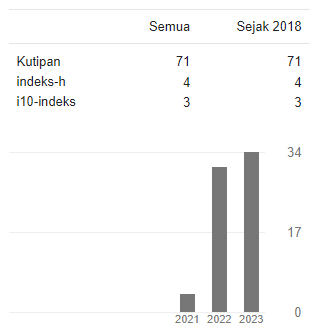Strategi Kampanye Politik Politisi Muda PKS Dalam Merebut Dukungan Konstituen
DOI:
https://doi.org/10.56873/jimik.v6i1.175Keywords:
Strategy, campaigns, political communication, youth politics, constituentAbstract
After the reforms that were launched in 1998, now politics in Indonesia is increasingly dynamic. Indonesian politics is now not only dominated by senior politicians, but also young politicians have emerged. These young politicians are also very aggressive in campaigning to win people's votes. What they highlight is that young politicians are relatively clean and have not been exposed to past political sins. This study aims to analyze the Political Campaign Strategy of Young Politicians of Prosperous Justice Party (PKS) in Seizing Constituent Support in 2019 political contestant. The method used in this research was descriptive qualitative method. The results show that the political campaign strategy of young politicians of Prosperous Justice Party (PKS) in seizing constituent support included seven stages. First, analyzing the political map, which was analyzing the social conditions of the region that would be used as a campaign site. Second, determining the target of votes. Third, forming a campaign team by forming a successful team to help the campaign process. Fourth, formulating a campaign strategy. Fifth, analysis of social connections (networks). Sixth, organizing campaigns by setting campaign schedules. Seventh, escorting the vote result by selecting and determining witnesses and volunteers in the electoral process in escorting the election process and vote result.
Downloads
References
Arifin, Anwar. 2011. “Komunikasi Politik (Filsafat - Paradigma - Teori - Tujuan - Strategi dan Komunikasi Politik Indonesia)â€. Yogyakarta: Graha Ilmu.
Bourne, P,.A (2010). Modelling Political Trust in a Developing Country Current. Research Journal of Social Sciences 2(2), 84-98.
Fatimah, Siti. (2018). Kampanye sebagai Komunikasi Politik: Esensi dan Strategi dalam Pemilu. Jurnal Resolusi, 1 (1)
Gioia, D.A., Corley, K.G. and Hamilton, A.L. (2013). Seeking Qualitative Rigor in Inductive Research: Notes on The Gioia Methodology. Organizational Research Methods, 16(1), 15-31.
Haste, H. & Hogan, A. (2006). Beyond Conventional Civic Participation, Beyond The Moral-Political Divide: Young People and Contemporary Debates about Citizenship. Journal of Moral Education, 35(4), 473-493.
Husein, Harun. (2016). Relawan di Pusaran Politik. www.republika.co.id/berita/koran/teraju/16/03/29/o4srwl20-relawan-di-pusaran- politik
Jensen J Michael. (2017). Social Media and Political Campaigning: Changing Terms of Engagement. The International Journal of Press/Politics, 22(1), 23–42.
Juditha, Christiany & Josep Darmawan. (2018). Penggunaan Media Digital dan Partisipasi Politik Generasi Milenial. Jurnal Penelitian Komunikasi dan Opini Publik, 22(2)
Nora, Ghazaly Ama La. (2014). Ilmu Komunikasi Politik. Yogyakarta: ANDI.
Rahman A H.I. (2018). Political Messages Processing of Presidential Candidate through Heuristic and Systematic Model in the 2014 Presidential Election in Indonesia. International Journal of Science and Research (IJSR), 7(7)
Rosita (2017). Partisipasi Politik Etnis Tionghoa dalam Keikutsertaan Pemilukada di Kabupaten Kuantan Singingi Tahun 2015. Jom Fisip Vol. 4 No. 1
Sabena. (2019). The Leadership Communication Style on Political Parties in the Digital Era. International Journal of English, Literature and Social Science (IJELS), 4(5).
Sayekti Dwi Purboningsih. (2015). Gerakan Sosial Baru Perspektif Kritis: Relawan Politik dalam Pilpres 2014 di Surabaya. Jurnal Review Politik, 5(1).
Syaifuddin. (2019). The Influence of Political Exposure in Digital Media to The Participation of Prospective Voters for Demokrat Party in East Java Ahead of The Election 2019. International Journal of Scientific and Research Publications, 9(12)
Wang Erik H. dan Yiqing Xu. (2018). Awakening Leviathan: The Effect of Democracy on State Capacity. Research & Politics, 5(2), 1-7.
Downloads
Additional Files
Published
Issue
Section
License
Penulis yang diterbitkan dengan jurnal ini menyetujui ketentuan berikut:
- Penulis  mempertahankan hak cipta dan memberikan jurnal hak publikasi pertama dengan karya yang secara bersamaan dilisensikan di bawah Lisensi Atribusi Creative Commons  yang memungkinkan orang lain untuk berbagi karya dengan pengakuan atas kepenulisan karya dan publikasi awal dalam jurnal ini.
- Penulis  dapat masuk ke dalam pengaturan kontrak tambahan yang terpisah untuk distribusi non-eksklusif dari versi terbitan jurnal dari karya tersebut ( misalnya  , pengirimannya ke repositori institusional atau menerbitkannya dalam sebuah buku), dengan pengakuan atas publikasi awalnya di jurnal ini.
- Penulis  diizinkan dan didorong untuk memposting karya mereka secara online (misalnya, di repositori institusional atau di situs web mereka) sebelum dan selama proses pengiriman, karena dapat mengarahkan pada pertukaran yang produktif, serta kutipan yang lebih awal dan lebih besar dari karya yang diterbitkan.Â
- Artikel dan semua materi terkait yang diterbitkan di bawah Lisensi Internasional Creative Commons Attribution-ShareAlike 4.0  .


